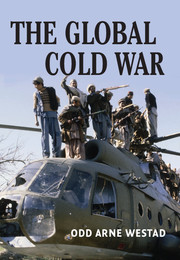Book contents
- Frontmatter
- Contents
- List of illustrations
- List of maps
- Acknowledgments
- List of abbreviations
- Introduction
- 1 The empire of liberty: American ideology and foreign interventions
- 2 The empire of justice: Soviet ideology and foreign interventions
- 3 The revolutionaries: anticolonial politics and transformations
- 4 Creating the Third World: the United States confronts revolution
- 5 The Cuban and Vietnamese challenges
- 6 The crisis of decolonization: Southern Africa
- 7 The prospects of socialism: Ethiopia and the Horn
- 8 The Islamist defiance: Iran and Afghanistan
- 9 The 1980s: the Reagan offensive
- 10 The Gorbachev withdrawal and the end of the Cold War
- Conclusion: Revolutions, interventions, and great power collapse
- Notes
- Index
3 - The revolutionaries: anticolonial politics and transformations
Published online by Cambridge University Press: 05 December 2012
- Frontmatter
- Contents
- List of illustrations
- List of maps
- Acknowledgments
- List of abbreviations
- Introduction
- 1 The empire of liberty: American ideology and foreign interventions
- 2 The empire of justice: Soviet ideology and foreign interventions
- 3 The revolutionaries: anticolonial politics and transformations
- 4 Creating the Third World: the United States confronts revolution
- 5 The Cuban and Vietnamese challenges
- 6 The crisis of decolonization: Southern Africa
- 7 The prospects of socialism: Ethiopia and the Horn
- 8 The Islamist defiance: Iran and Afghanistan
- 9 The 1980s: the Reagan offensive
- 10 The Gorbachev withdrawal and the end of the Cold War
- Conclusion: Revolutions, interventions, and great power collapse
- Notes
- Index
Summary
From the mid-nineteenth century up to 1920 more than 450 million people in Africa and Asia came under direct colonial rule. Britain, France, Russia, the Netherlands, and Portugal – the old European colonial powers – were followed by the newly formed Germany and Italy, by Belgium, and, in a somewhat hesitant manner, by the United States. Even Japan – itself a victim of imperialist expansion at the beginning of the epoque – joined the club of aggressors. While the capacity for expansion arose from the changes in technology, organization, and communication that took place in the nineteenth century, the motives varied from the search for markets and raw materials to religious zeal and national pride. By the early twentieth century most people in the capitalist countries had stopped asking for motives: imperialism to them had become the natural order of things, just like the Cold War would be two generations later.
In spite of the vigorous defense put up in many Third World areas, it often took decades after the attacks before the victims were able to organize comprehensive resistance to colonial rule. The brutality of the invasions and occupations were fearful – one recent estimate is that the direct and indirect death toll from the colonial wars was around five and a half million. In addition, as Mike Davis has shown, famines set off by global droughts reached catastrophic proportions in Asia and Africa in the late nineteenth century in part because the attacks had undermined social structures that in times past might have ameliorated the suffering.
- Type
- Chapter
- Information
- The Global Cold WarThird World Interventions and the Making of Our Times, pp. 73 - 109Publisher: Cambridge University PressPrint publication year: 2005



